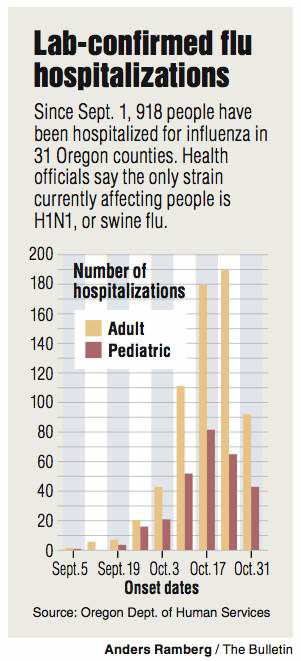With swine flu, take care and don’t panic, officials say
Published 4:00 am Friday, November 13, 2009

- With swine flu, take care and don't panic, officials say
As federal health officials up their estimate of U.S. swine flu deaths so far this year from 1,200 to 4,000 people, state and local health leaders say the new numbers shouldn’t be a cause for panic — but should be a reminder of the importance of flu prevention.
In Oregon, about 30 people have died from influenza since Sept. 1, and five Central Oregonians have died from flu since this summer. Because seasonal flu doesn’t usually hit until mid-winter, Richard Leman, an epidemiologist with the Oregon Public Health Division, said officials believe the flu cases popping up around the state are H1N1, the strain also known as swine flu.
More than 900 people have been hospitalized for flu in Oregon in just over two months, but because only an estimated 1 percent of people with the flu end up in the hospital, the actual number of people who have had the flu could be close to 100,000.
Despite the high numbers — and the revised estimate of deaths — officials say their message and strategies remain largely unchanged.
“It makes sense to be paying attention,” Leman said. “It is not necessary to become frantic. Every year, on average, 36,000 people die in the United States of influenza. These numbers are certainly lower than that, but they’re showing up earlier and the regular flu season has not yet begun. But there are things we can do right now to help protect ourselves and protect others.”
Though the Centers for Disease Control and Prevention is changing the way national swine flu data is tracked, Leman said the state plans to continue to measure its cases the same way it has since September. State officials gather reports of deaths from hospitals, county health departments and medical examiners.
“Deaths are considerably more straightforward to track than numbers of people with illness,” Leman said.
So far, babies and young children up to age 4 have been admitted to the hospital at a higher rate than any other age group, but nearly all of the deaths have been people 25 or older.
In Deschutes County, two residents who died from swine flu were 34 years old. The others were 73, 78 and 86 years old, according to the Deschutes County Health Department. The county has had 63 confirmed cases of the flu.
Crook County has had four confirmed swine flu cases and no deaths, according to county health officials. Jefferson County, meanwhile, has had 11 cases of the flu and no deaths, according to state records.
Shannon Dames, Deschutes County’s communicable disease manager, said the people who died had other underlying health concerns that put them at greater risk when they contracted the flu.
In addition, older people who get the flu are more likely to have complications, though they are less likely to get the flu in the first place. Officials believe people older than 65 may have been exposed to a similar virus in the past and developed some kind of immunity against the current strain.
“People over the age of 65 still need to be vigilant on their traditional hygiene practices: wash their hands, cover their cough, avoid being around people who are sick,” Dames said. “They do have a better chance of not getting infected, that is in their favor, but if they do get infected, just like they do with seasonal flu, it can be more serious.”
Health officials have encouraged people to get vaccines for both swine flu and seasonal flu. But shipments of the swine flu vaccine have been slow to arrive, causing authorities to ration the vaccines to priority groups, such as children, pregnant women, some health care workers and people with medical conditions like asthma, diabetes and heart disease.
Dames said officials are starting to put more focus on getting vaccines to people in the 25-to-64 age group who have other medical conditions, because the statistics available show that group is at particularly high risk of developing complications.
She said the decisions about who gets the vaccine and when have left some people confused, but noted that with a limited supply, officials have to target the groups that are most likely to get the flu. And while older people might be more likely to get a serious case of the flu, they are not currently a priority group because they are less likely to get it at all.
And though Dames said officials believe the vaccine can be beneficial for most people, it seems to be less effective in older people.
“The vaccine is not a silver bullet, no matter how we look at it,” Dames said. “And as we go up in age groups, it’s less and less of a silver bullet, even if we were vaccinating that age group completely.”
Officials say they’re not sure what will happen this winter, when seasonal flu and swine flu are spreading at the same time, but are hopeful good preparation will help keep the numbers as low as possible. Leman said good hand-washing habits and staying away from people who are sick can go a long way, in addition to getting flu vaccines.
“It’s very important that people recognize it’s not all about pandemic H1N1,” Leman said. “It makes sense for people to protect themselves by getting the seasonal flu vaccine.”






